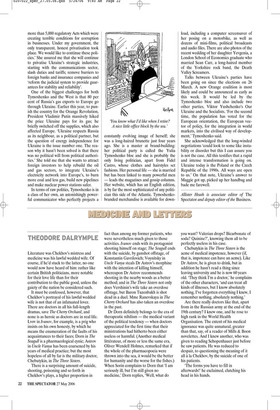Literature was Chekhov’s mistress and medicine was his lawful wedded
wife. Of course, if he’d stuck to the latter, no one would now have heard of him: rather like certain British politicians, more notable for their love life than for their contribution to the public good, unless the gaiety of the nation be considered such.
It must be confessed, however, that Chekhov’s portrayal of his lawful wedded wife is not that of an infatuated lover. There are doctors in all his full-length dramas, save The Cherry Orchard, and none is as heroic as doctors are in real life. Lvov in Ivanov, for example, is a prig who insists on his own honesty, by which he means the enumeration of the faults of his acquaintances to their faces; Dorn in The Seagull is a pharmacological cynic; Astrov in Uncle Vanya has been coarsened by his years of medical practice; but the most hopeless of all by far is the military doctor, Chebutykin, in The Three Sisters.
There is a surprising amount of suicide, shooting, poisoning and so forth in Chekhov’s plays, a higher proportion in fact than among my former patients, who were nevertheless much given to those activities. Ivanov ends with its protagonist shooting himself on stage; The Seagull ends with the suicide, by gunshot offstage, of Konstantin Gavrilovich; Voynitsky in Uncle Vanya steals Dr Astrov’s morphine with the intention of killing himself, whereupon Dr Astrov recommends shooting in the nearby woods as a better method; and in The Three Sisters not only does Vershinin’s wife take an overdose offstage, but Baron Tuzenbakh is shot dead in a duel. Mme Ranevskaya in The Cherry Orchard has also taken an overdose in the past.
Dr Dorn definitely belongs to the era of therapeutic nihilism — the medical variant of the political tendency — when doctors appreciated for the first time that their ministrations had hitherto been either useless or harmful. (Another medical littérateur, of more or less the same era, Oliver Wendell Holmes, remarked that if the whole of the pharmacopoeia were thrown into the sea, it would be the better for humanity and the worse for the fishes.) When Sorin complains to Dorn that ‘I am seriously ill, but I’m still given no medicine,’ Dorn replies, ‘Well, what do you want? Valerian drops? Bicarbonate of soda? Quinine?’, knowing them all to be perfectly useless in his case.
Chebutykin in The Three Sisters is the acme of medical impotence, however (if, that is, impotence can have an acme). Like Dr Astrov, he is given to drink, but in addition he hasn’t read a thing since leaving university and he is now 60 years old. ‘They think I’m a doctor,’ he complains of the other characters, ‘and can treat all kinds of illnesses, but I know absolutely nothing, I’ve forgotten everything I knew, I remember nothing, absolutely nothing.’ Are there really doctors like that, apart from in the Russian army at the end of the 19th century? I knew one, and he rose to high rank in the World Health Organisation. The extent of his medical ignorance was quite unnatural, greater than that, say, of a reader of Mills & Boon novelettes. And I knew another, who was given to reading Schopenhauer just before he saw patients. He was reduced to despair, to questioning the meaning of it all à la Chekhov, by the suicide of one of his patients.
‘The forms you have to fill in afterwards!’ he exclaimed, clutching his head in his hands.










































































































 Previous page
Previous page